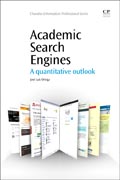
Academic Search Engines: intends to run through the current panorama of the academic search engines through a quantitative approach that analyses the reliability and consistence of these services. The objective is to describe the main characteristics of these engines, to highlight their advantages and drawbacks, and to discuss the implications of these new products in the future of scientific communication and their impact on the research measurement and evaluation. In short, Academic Search Engines presents a summary view of the new challenges that the Web set to the scientific activity through the most novel and innovative searching services available on the Web. This is the first approach to analyze search engines exclusively addressed to the research community in an integrative handbook. The novelty, expectation and usefulness of many of these services justify their analysis.This book is not merely a description of the web functionalities of these services; it is a scientific review of the most outstanding characteristics of each platform, discussing their significance to the scholarly communication and research evaluation.This book introduces an original methodology based on a quantitative analysis of the covered data through the extensive use of crawlers and harvesters which allow going in depth into how these engines are working. Beside of this, a detailed descriptive review of their functionalities and a critical discussion about their use for scientific community is displayed. INDICE: Introduction. What is an academic search engine? Challenges of an academic search engine; Evolution of Academic Search Engines; Future perspectives. CiteSeerx: a scientific engine for scientists. Autonomous citation indexing; Coverage: the standstill; Structure and functionalities: a searchable digital library; Searching; Data consistency: parsing mistakes; Other Seers: the CiteSeerx's lab; Conclusions: parsing weakness. Scirus: a multi-source searcher. Content: web pages and authoritative sources; Crawling and Data extraction; Searching: source filtering; Ranking on links; Conclusions: a disappeared opportunity. AMiner: science networking as information source. Functioning: a networked engine; Structure: a chaotic design; Coverage: on open sources; Searching: a common documents engine; Profiles; Patent Miner; Conclusions: a half academic search engine. Microsoft Academic Search: the multi-object engine. Functioning: An Object-Level vertical search engine; Coverage: the weakness of its updating; Searching: the filtering richness; Structure: the strength of profiling; Visualization: graphs as research assessment tools; Conclusions: a modular academic engine. Google Scholar: on the shoulders of a giant. Functioning: a specialization of Google; Coverage: feeding back its own sources; Searching: opacity of their results; Structure: Citations and Metrics; Conclusions: the most exhaustive academic search engine. Other academic search engines. Base; Q-Sensei Scholar; WorldWideScience.org. Comparative analysis. Functioning; Structure; Coverage; Searching; Final Remarks.
- ISBN: 978-1-84334-791-0
- Editorial: Chandos Publishing
- Encuadernacion: Rústica
- Páginas: 222
- Fecha Publicación: 15/08/2014
- Nº Volúmenes: 1
- Idioma: Inglés
